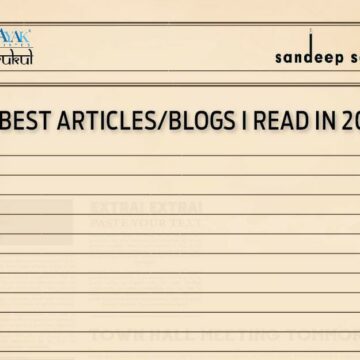
“Asato Maa Sad Gamaya,
TamasoMaa,JyotirGamaya,
Mritor Maa,
AmritamGamaya,
Aum Shanti Shanti, Shanti!”
~Rig Veda.
(God, please lead me (by giving me knowledge) from the unreal to the real, From darkness (of ignorance) to the light(of knowledge), from death(limitation) to immortality(liberation)
Acquiring wisdom is like irrigating a field, you just need to clear the path for the water, then it will flow on its own. Thinking that you know everything is the biggest obstacle to this flow. The danger of success is to think that what you did yesterday will be sufficient for tomorrow.
As the worlds of our business change dramatically every day, with technology literally reshaping our dreams, we have got to be curiouser than ever before, to keep our minds open to every idea, every movement that bears the seed of future innovation. Learning and innovation go hand in hand.
Reading is what opens my mind and helps feed the curiosity. I have collated 21 best articles according to me from the reading that I did in 2021. Being in the wealth management space and because of my role as a motivational speaker, the articles are biased towards Finance, investing and self-development. There are many more writings which merited inclusion in the list but due to the ‘21’ restriction, I had to shortlist what I felt were the most useful and fulfilled the criterion of diversified reading.
1. Are You Dreaming Too Big?
Author: Arthur C. Brooks
Source: The Atlantic (https://www.theatlantic.com/family/archive/2021/03/how-follow-your-dreams-and-get-happier/618384/ )
Setting ourselves goals to pursue, whether personal or professional, helps give direction to our efforts. But not all goals are helpful, says Arthur Brooks in this piece for The Atlantic. He says we shouldn’t be subjecting our sense of achievement to concentration risk by having one ambitious lifelong goal. We should rather set ourselves a series of shorter time goals which are achievable and hence provide us a continuous source of happiness from achievement and enjoy the journey too.
2. Top Ten Trends of 2021
Author: Ruchir Sharma
Source: Morgan Stanley (https://www.morganstanley.com/im/en-cl/institutional-investor/insights/articles/the-top-ten-trends-of-2021.)
The Ruchir Sharma Trends for each year are the most looked forward to piece of reading at the start of every year. NDTV also records a program with him on the same subject which analyses the last years predictions and the current years forecasts. He also regularly writes for TOI, FT & NYT. On my must read list, I have really liked his other articles too this year titled, ‘How the US tech giants could fall’, ‘The Bubbles of 2021’ and ‘Which Country Will Triumph in the Post-Pandemic World?’ apart from many other articles.
3. Something of Value: The art and Science of Value Investing
Author: Howard Marks
Source: Oaktree Capital (https://www.oaktreecapital.com/docs/default-source/memos/something-of-value.pdf?sfvrsn=b0d46166_8)
The dichotomy of “value” and “growth” investing has become a sharp stylistic divide. But is it helpful? Howard Marks writes in his latest memo how he views the art and science of value investing, especially in the increasingly efficient and complex world we face today.
4. The Best Advantage in Life
Author: Nick Maggiulli
Source: Of Dollars and Data (https://ofdollarsanddata.com/the-best-advantage-in-life/)
Warren Buffet talked about the ‘ovarian lottery’ i.e, the biggest influence on the average human’s life will be the conditions of our birth – where you were born and who you were born to. In this piece, Nick Maggiulli drives home the point, as usual with research and data to back it. His post was triggered by an online poll showing highest votes cast for rich parents as the factor that best improves your career prospects in investment management, more than a CFA, or an MBA or a great first job.
5. How To Guarantee Misery
Author: TessANG
Source: (https://tessang.com/selfdevelopment/howtoguaranteemisery/)
Charlie Munger is a huge advocate for “inversion”. His famous quote, “All I want to know is where I’m going to die, so I’ll never go there” forms the basis for this article. Thinking in reverse is a powerful tool. Not only in the world of investing but also in our lives.For instance, it is important, if not more important to ask “How can I AVOID making mistakes when investing?” rather than “How can I achieve the highest returns?”.
6. The Highest Forms of Wealth
Author: Morgan Housel
Source: Collaborative Fund(https://www.collaborativefund.com/blog/the-highest-forms-of-wealth/ )
We at Sahayak Associates are in the business of wealth creation. But what underlying purpose does wealth creation serve often gets confusing in the minds of people even those who have plenty as Morgan Housel shows in this short read. An enjoyable quick read as usual.
7. The Feynman Learning Technique
Author: Farnam Street
Source: Farnam Street(https://fs.blog/2021/02/feynman-learning-technique/ )
All of us are being told that we will have to work until 70 years of age and hence will have to reinvent ourselves 2-3x during a five decade long career. What nobody is willing to tell us is how on earth we are supposed to rebuild our skillsets 2-3x during our career. How will we learn new skills and master new competencies again and again during our careers? Farnam Street comes to our rescue with a blog which summarises the key learning hacks of the Nobel Prize winning physicist, Richard Feynman.
8. The coming battle over the metaverse
Author: Richard Waters
Source: Financial Times (https://www.ft.com/content/a2b52296-ddeb-4beb-a286-020e349e0fe8)
Many of the digital aspects of our lives today would have seemed like science fiction even a couple of decades ago. The buzz word these days that paints a similarly fictitious sounding futuristic picture is Metaverse – which Wikipedia defines as “a collective virtual shared space, created by the convergence of virtually enhanced physical reality and physically persistent virtual space, including the sum of all virtual worlds, augmented reality, and the Internet.” Whilst the concept has been around for long, it has gained traction of late thanks to some powerful voices in the tech industry. As this article says, it is understandable for Mark Zuckerberg to talk up the Metaverse, given Facebook’s investments in virtual reality. But Satya Nadella’s reference to it at a tech conference earlier this year and Ben Thompson’s detailed yet sceptical piece earlier this month makes it worth tracking this development.
9. China’s Tech Crackdown: It’s about Control, not Consumers or Competition!
Author: Aswath Damodaran
Source: https://aswathdamodaran.blogspot.com/2021/09/chinas-tech-crackdown-market-adjustment.html
For the last two decades, China has been the dominant story for both the global economy and capital markets, as the country’s immense growth and infrastructure investments have sustained commodity prices, and altered the balance of world economic power.
In this post, Aswath Damodaran begins by tracing out the rise of China to global economic power, and then focus on Chinese tech companies, with the intent of examining how government actions and inactions can affect value and pricing.
10. Give Yourself a Break: The Power of Self-Compassion
Author: Serena Chen
When you have a setback at work, treat yourself as you would a friend: with kindness and understanding. When we experience a setback at work, we tend to either become defensive and blame others, or berate ourselves. Neither response is helpful. Shirking responsibility by getting defensive may alleviate the sting of failure, but it comes at the expense of learning. Self-flagellation, on the other hand, may feel warranted in the moment, but it can lead to an inaccurately gloomy assessment of one’s potential, which undermines personal development.
Research shows that we should respond instead with self-compassion. People who do this tend to demonstrate three behaviors: First, they are kind rather than judgmental about their own failures and mistakes; second, they recognize that failures are a shared human experience; and third, they take a balanced approach to negative emotions when they stumble or fall short—they allow themselves to feel bad, but they don’t let negative emotions take over.
Self-compassion boosts performance by triggering the “growth mindset”—the belief that improvement is achievable through dedication and hard work. It also helps us connect with a more authentic self.
11. How the Supply Chain Broke, and Why It Won’t Be Fixed Anytime Soon
Author: Peter Goodman
Source: The New York Times (https://www.nytimes.com/2021/10/22/business/shortages-supply-chain.html )
In this explanatory piece in the New York Times, Peter Goodman jogs our memory back to how it all started in the pandemic and more importantly breaks the bad news about why the global supply chain is unlikely to be fixed anytime soon.
12. How People Get Rich Now
Author: Paul Graham
Source: Paul Graham’s blog https://paulgraham.com/richnow.html
Growing wealth inequality is a commonly accepted social issue that is plaguing the world. Some ascribe that to poor governance on the part of our lawmakers whereas some others point to the low interest rates which has driven financial asset inflation which makes the rich richer and doesn’t particularly benefit the poor. Paul Graham, a computer science expert, founder of a tech company and most famously the founder of Y Combinator, the prolific global start up incubator, comes at it differently.
Paul dissects the Forbes 100 richest Americans list of 1982, when it was first published and its most recent one in 2020, to see how the composition of the rich has changed and if there’s any clue we can get about wealth inequality from there.
13. India’s Growth Story Towards $10 Trillion Economy 🇮🇳
Author: Sandeep Sahni
Source: Network FP Thinktank
We are making our clients invest in Indian equities majorly through Mutual Funds and/or directly in stocks.
Clients usually ask, “What are your views about the Indian economy?”
Are you confident enough about India’s growth in the long run?
Tremendous wealth is going to be created in India in the next 5-10 years as we are on the cusp of a ‘Chronological lottery’
I wrote about India’s growth story to give you insightful views about the Indian economy in a way you never would imagine. Don’t miss it!
Read the full article here: https://bit.ly/india-growth-story
14. Napping in the afternoon can improve memory and alertness – here’s why
Author: John Axelsson and Tina Sundelin
Source: The Conversation (https://theconversation.com/napping-in-the-afternoon-can-improve-memory-and-alertness-heres-why-154423 )
It is a tradition in many societies to have an afternoon nap, most popularised by the Spanish Siesta. Psychology scholars John Axelsson and Tina Sundelin, in this article, highlight recent studies around the benefits of mid-day naps not just in terms of recharging our mental batteries but also long term cognitive benefits. As the authors highlights whilst most workplaces are not equipped to facilitate a midday nap, ‘work from home’ actually makes it a practical routine now.
15. The Big Lessons of the Last Year
Author: Morgan Housel
Source: The Collaborative Fund (https://www.collaborativefund.com/blog/the-big-lessons-of-the-last-year/ )
In yet another lucid piece, this time on what should we make of our experiences, Morgan Housel shows how we often draw the wrong lessons from history and provides us a template for the right takeaways, which are usually broad than precise. Loved the quote from the blog, “Big risks are easy to underestimate because they come from small risks that multiply.
16. The ESG Movement: The “Goodness” Gravy Train Rolls On!
Author: Aswath Damodaran
Source: https://aswathdamodaran.blogspot.com/2021/09/the-esg-movement-goodness-gravy-train.html
Aswath Damodaran Bisects the theory behind ESG Investing, the current fad, and offers a great perspective.
The starting point for the ESG argument is the premise that we can come up with measures of goodness that can then be targeted by corporate managers and used by investors. To meet this demand, services have popped up around the world, claiming to measure ESG with scores and ratings.
17. To choose a career, I needed to do more than ‘follow my dream’
Author: Ananya Sen
Source: Science (https://www.sciencemag.org/careers/2021/05/choose-career-i-needed-do-more-follow-my-dream )
India has the youngest demographic not just in the contemporary world but also in the history of this planet: no country has ever had more people under the age of 30 than India has today. It is but inevitable that in such an environment, many parents and their progeny spend a lot of time plotting a path to the top of “prestigious professions” like Medicine, Technology and Finance. This article from a young Indian student – who went to study in the US with the usual head full of dreams and then discovered a very different reality – offers a more useful template for building a career.
18. Corner Stores Are the New Darlings of the Global Tech Industry
Author: Louise Matsakis
Source : The Atlantic (https://www.theatlantic.com/technology/archive/2021/12/tech-companies-winning-over-corner-stores/620964/ )
A billion-dollar effort to turn these unassuming Grocery shops into mini–tech hubs is only just beginning. In India, we are seeing a clutch of VC funded start-ups and large corporate funded efforts to become a supplier to the kirana store ecosystem. This article in The Atlantic explains that such businesses are mushrooming all over the world. It’s no wonder that when the tech industry looks at these shops, it sees dollar signs. Over the past few years, dozens of start-ups flush with more than $1 billion from investors have sprung up to turn mom-and-pop stores into digital retailers and mini–tech hubs.
19. The Twenty Craziest Investing Facts Ever
Author: Michael Batnick
Source: The Irrelevant Investor (https://theirrelevantinvestor.com/2021/03/16/the-twenty-craziest-investing-facts-ever-2/)
Amazing data backed insights and Facts from the Wall Street. A short 2 minute read and most misconceptions that we carry about investing get cleared.
20. How to be a genius
Author: Craig Wright
Source: Aeon (https://aeon.co/essays/what-can-we-learn-from-the-secret-habits-of-genius)
Craig Wright is a professor at Yale where he teaches a course on “genius” (in the competitive job market these days, nothing less will do). His most recent book is The Hidden Habits of Genius: Beyond Talent, IQ, and Grit – Unlocking the Secrets of Greatness (2020). In this really interesting long essay he simplifies the secret sauce to becoming a genius into a simple mathematical formula.
21. The changing Corporate Landscape
Author: Neelkanth Mishra
Source: Business Standard (https://www.business-standard.com/article/opinion/india-s-changing-corporate-landscape-121040501250_1.html)
This article is the first of a series of 4 articles written by the author on “100 Unicorns: India’s changing corporate landscape”. In the next parts we will discuss other factors that have made India a fertile ecosystem to absorb this influx of capital, the impact of these unicorns on the economy, and what lies ahead. The other articles in the series are ‘Progress comes in Layers’, ‘The start, not the end of Unicorn Seeding’, and the ‘Virtuous cycle of Entrepreneurship’ and can be read at (https://www.business-standard.com/author/search/keyword/neelkanth-mishra)
Kindly keep the feedback coming.
Education is the only thing lying around loose in the world, and you can have as much as you are willing to haul away. Education does not take place when you learn something you did not know before. Education is your ability to use what you have learned to be better today than you were yesterday. We hope that the New Year keeps on raising the curiosity in you and you keep on reading to satisfy it.
I seriously suggest that you subscribe to some of these publications and to the Newsletters from which the above blogs / articles have been selected. When the content lands in your mail or on WhatsApp, it is much easier to read than to hunt for the articles that you must read.
May the New Year bring more dreams and more hopes and may you keep raising the bar to upskill and teach yourself.
Happy Reading!
Have a great year ahead.
Stay Blessed Forever.

Kindly check our earlier blog on a similar subject : Investment Lessons from Mythology at https://sahayakgurukul.blogspot.com/2019/03/investment-lessons-from-mythology.html OR https://www.sahayakassociates.in/resources/our-blog/2553-sahayak-associates/sahayak-associates-blog/8435-investment-lessons-from-mythology
Note: All information provided in this blog is for educational purposes only and does not constitute any professional advice or service. Readers are requested to consult a financial advisor before investing as investments are subject to Market Risks.
About The author

Sandeep Sahni
After completing his schooling from St. Johns, Chandigarh (Class of 1980) and Modern School, New Delhi, (Class of 1982) Sandeep did his B. Com (Hons.) from Shri Ram College of Commerce, Delhi University (Class of 1985)
Sandeep is an alum of IIM Lucknow with a Post Graduate Degree (MBA class of 1988).
He has also written two books, ‘Dear Son, Life Lessons from a Father’ on the teachings of Life https://www.amazon.in/dp/1637815271 and the Second book which he has Co Authored titled, ‘What My MBA Didn’t teach me about Money’ on the Human and Financial perspective of money. https://www.amazon.in/dp/1637816502
He has a rich work experience and started his career as a corporate man with Asian Paints after IIML. He has a rich experience covering the FMCG, Food Distribution, Cold Chain, Logistics, and Hospitality Industries. He is currently in the Wealth Management and Personal Finance domain. He has a passion for finance and is an active speaker on topics in finance. The stories he narrates strike a chord close to his heart, as they are based on events from his own life. He believes in a holistic view of Personal Finance.
Sandeep’s investing experience and study of the Financial Markets spans over 30 years. He is based in Chandigarh and is advising more than 500 clients across the globe on Financial Planning and Wealth Management.
He has promoted “Sahayak Gurukul” which is an attempt to share thoughts and knowledge on aspects related to Personal Finance and Wealth Management. Sahayak Gurukul provides financial insights into the markets, economy and Investments. Whether you are new to the personal finance domain or a professional looking to make your money work for you, the Sahayak Gurukul blogs and workshops are curated to demystify investing, simplify complex personal finance topics and help investors make better decisions about their money.
Alongside, Sandeep conducts regular Investor Awareness Programs and workshops for Training of Mutual Fund Distributors, and workshops and seminars on Financial Planning for Corporate groups, Teachers, Doctors and Other professionals.
Through his interactions and workshops, Sandeep works towards breaking the myths and illusions about money and finance.
His passion has driven him towards career counselling for young adults and mentoring the youngsters on achieving their life goals and becoming “Successful Humans”
He also writes a well-read blog; https://sahayakgurukul.blogspot.com
He has also conducted presentations, workshops and guest lectures at professional colleges and management institutes for students on Financial Planning and Wealth Creation.
He can be reached at:
+91-9888220088, 9814112988,
sandeepsahni@sahayakassociates.in
Follow on:
www.sahayakassociates.in,
www.facebook.com/sahayakassociates,
www.twitter.com/sahayakassociat,https://www.instagram.com/sahayakassociates/
https://sahayakgurukul.blogspot.com, https://www.sahayakassociates.in/resources/our-blog







